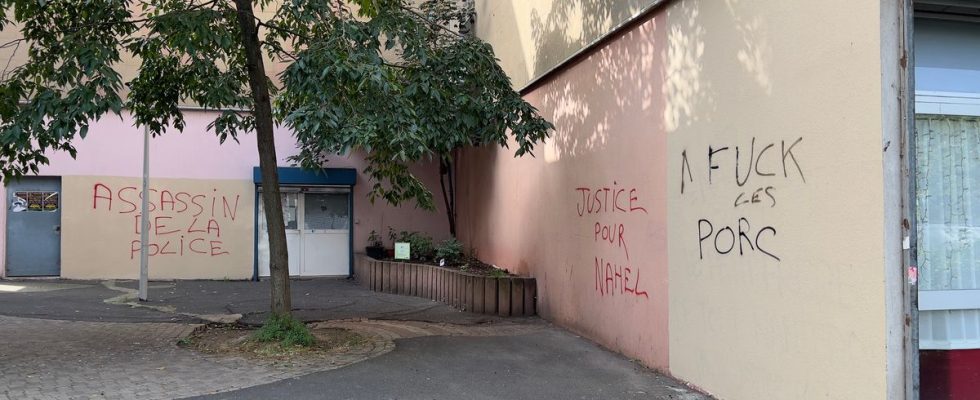Under a blazing sun, the Pablo Picasso district lives quietly this Tuesday morning at the start of the school year. Between the round trips to the food shops and the few onlookers sipping a coffee on the terrace, it is hard to believe that the fire which hit France at the end of June started here. However, between the broken bus stops, a half-burnt transformer and revolt tags on every street corner, the stigma is still very present two months after the death of young Nahel, killed by a police officer on June 27 2023 in Nanterre, an event that will lead to riots all over France.
“A wound that has stopped bleeding, but it is not healed”
“It’s the calm after the storm, laughs Alban, and probably before the next one. “Living for twelve years a few streets from the city where Nahel was from, he knows that the apparent serenity is only temporary: “It’s a wound that has stopped bleeding, but it is not healed for as much. »
Adia can only abound. While knitting sitting on avenue Pablo Picasso, she comments: “Life has resumed its normal course. But the traces of the riots are everywhere. One would think that they do not want to erase the damage on purpose. For example, she cites the many LBD cartridges that still dot the André Malraux departmental park a few steps away.
The “rage” still present
“The police have been nicer since then. Now they say hello in passing. Before, it was reserved for elegant young girls. The only notable change according to Adia. But if relations with “certain” members of the police have softened, distrust of the police has not changed for Loubna Benazzi, director of the association Authenti-cité, whose office is on the avenue: “Even when we need them, we’re afraid to call on them because we don’t know how it’s going to be. Before Nahel, several young people were subjected to abusive checks, they were photographed by the police, without anyone knowing why. Some are traumatized. »
According to Loubna Benazzi, these behaviors have fueled “the rage” that some young people in the neighborhood have in their stomachs. “Nahel’s death was the straw that broke the camel’s back. Today it’s calmer but that rage hasn’t gone away, because the situation hasn’t changed. As proof, she recounts this tag “Justice for Nahel” reappeared on Tower 11 of the city on Sunday: “Every time it is cleaned, it comes back again. This is what must be understood. »
Sitting on the steps of the district town hall, Amine, 22, explains this expectation of the inhabitants, and especially of the young people of Nanterre: “We will not give up this fight. Because too many things are wrong here. We can’t find work, we are treated like crap. That’s what it means. And that starts with having the right to the same justice as the others. »
Breaking down determinism
In front of the Fontenelles media library, a few meters from where the white march for Nahel started on July 2, Mounia confirms the difficulties of young people in the neighborhood. Even his son, in higher education in commerce, fears that he will not be able to find an internship or work because of his lack of network and his address: “When we ask him where he lives, he answers ”La Défense” , it works better. A situation that “mines” him.
Martin*, a teacher at Lycée Joliot-Curie, affected by violent events at the start of the last school year, notes the disarray of these young people: “Even some brilliant students from the neighborhoods end up integrating this determinism. They were born there so they will have to ”finish” there. It’s hopeless for them, and that’s what explains the revolt. The events of July do not change anything, and that, they are aware of it. »
It is also to fight against this fatalism that the Authenti-cité exists. The association offers school support, acts as a public writer for people in difficulty and distributes meals, also offers fun activities for children during school holidays and on Wednesdays: “But also parties like the one that we have organized for young graduates, baccalaureate, BTS or Master of the district. To celebrate them, but also to open up other young people to other things. Show them that they shouldn’t shut themselves up. »
A call to elected officials
Despite this positivism, Loubna Benazzi continues to see a troubled future: “Subsidies are falling, and with inflation, the cost of living is becoming unbearable for many people, it is only getting worse”. Both employees and volunteers of the association would like to see the media and elected officials a little more often outside of troubled times: “The rare times they come, it’s to tell us ‘it’s good, keep going’ ‘. But they do nothing more to help us. »
Worse, according to Marie*, who came to pick up her child from Joliot-Curie high school, the authorities are playing with gasoline above the still smoldering embers of the riots: “What are they doing to us with the abaya? Aren’t there more important subjects like orientation and Parcoursup that does nonsense? And Macron who talks about the abaya and Samuel Paty as if it were linked, what does he do apart from still stigmatizing the same people? He wants to put the kids back on the street? »
*Names have been changed at the request of the speakers

